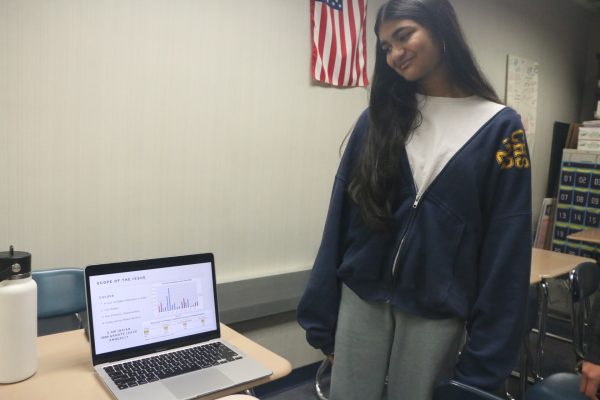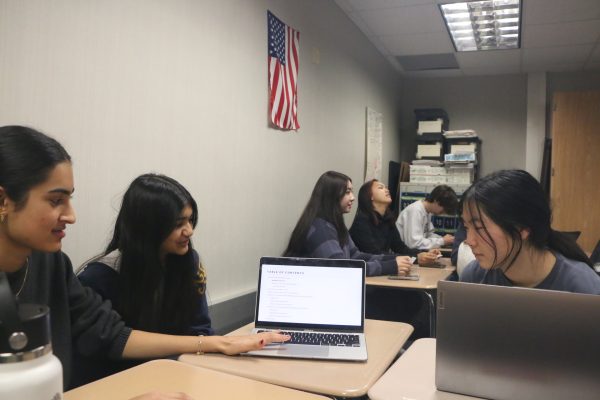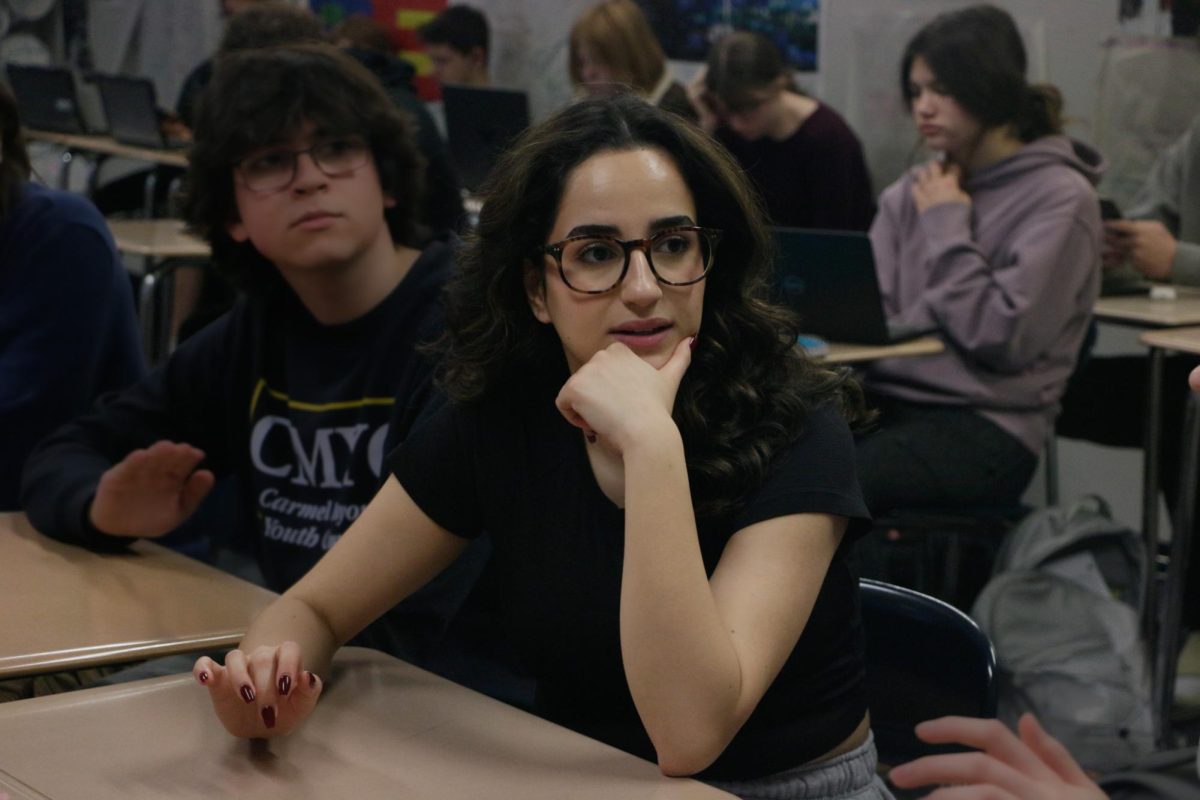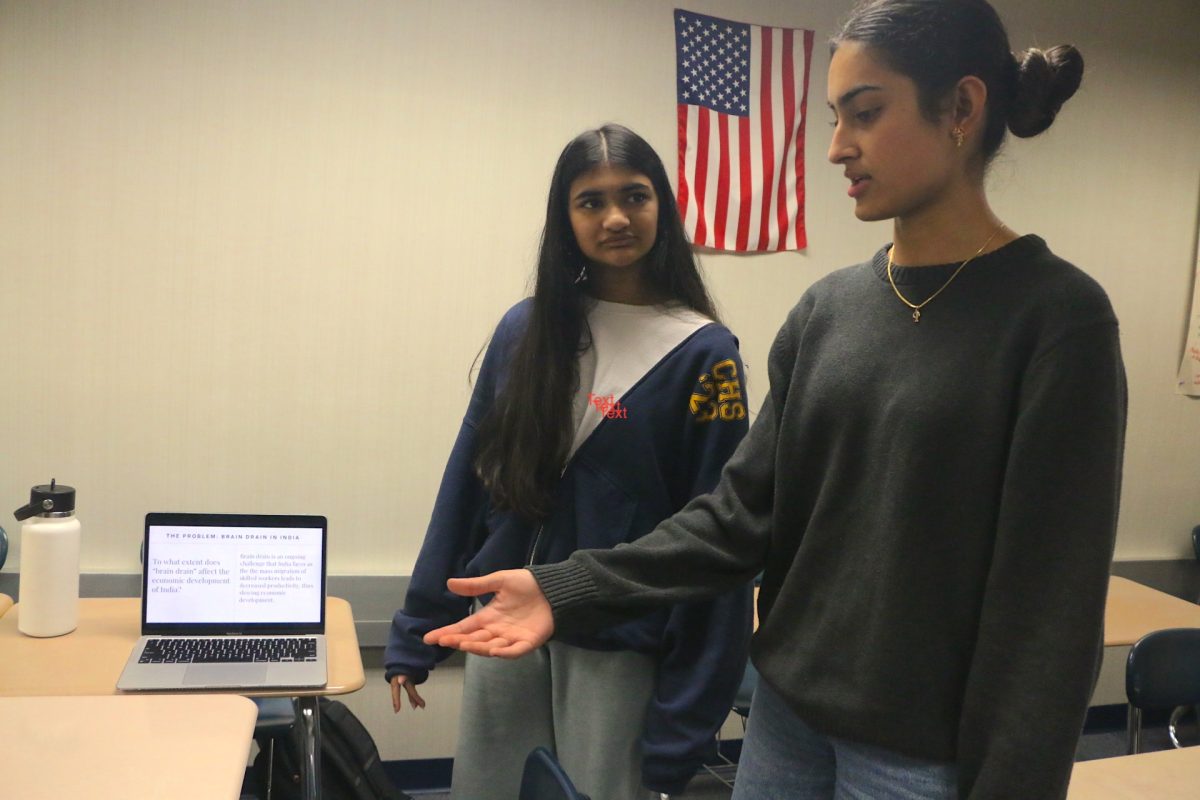Sophomore Ellen Rozmaryn was hesitant to take AP Seminar this year. Rozmaryn said she didn’t know what the class would be like and how helpful it would be. But one semester in, she said she felt like the class really helped her.
“My writing has already improved tremendously,” Rozmaryn said. “When I (used to) write, I liked to write how I’m talking and add a lot of fluff, but it’s really trained me to write a research-focused and more informative paper, instead of a more casual paper.”
Through taking this class, Rozmaryn said she has also learned how to read academic papers, analyze the media she experiences and improved her critical thinking skills.
Rozmaryn is not alone in recognizing the importance of these skills. 94% of people think that critical thinking skills are “extremely important” or “very important,” but 60% of respondents reported not studying critical thinking in school.
AP Seminar teacher John Love said that he thinks AP Seminar and AP Research help students gain these important critical skills.
“I wish I had the opportunity to take (a class) like this because I think it just… makes you think about things differently,” Love said. “You know sometimes we live in a bubble, we all do, and so this might push you out of your comfort zone and make you think a little bit differently than you’ve ever thought about something.”
Love said research-based classes like AP Seminar encourage students to learn researching skills, analyze media and apply critical thinking, skills that he hopes his students will take with them after they leave high school.

Research Skills
Ashlyn Higley, former AP Research student and senior said both her AP Seminar and AP Research classes helped her gain valuable research skills.
“(I learned) how to identify a problem or gap in research,” Higley said via email. “There is a lot of research already out there so it can be difficult trying to find a topic that has yet to be researched but that is where AP Research is so beneficial. It teaches you how to find a niche topic that’s results would significantly contribute to existing research while adding to the overall knowledge of the area of interest.”
Rozmaryn said she learned how to use existing resources better through her AP Seminar class.
“I’ve learned a lot of skills about how to use a lot of different databases at the library,” Rozmaryn said. “I’ve also learned a lot about how to read scientific journals because I didn’t have a lot of experience with reading those.”
Higley, too, said she learned how to read research papers and scientific journals.
“In (AP) Seminar and (AP) Research (I learned) how to read a research paper,” Higley said. “While that may seem obvious to many people, a majority of students when conducting research often skim or just read the intro of a paper that seems to fit their research, ignoring the rest of the paper. Thoroughly reading a research paper can give you important insight into debates or discussion about your topic that could (be) beneficial to the context of your research.”
Love also emphasized the importance of teaching students how to better utilize the resources they have.
“We’re very lucky here at Carmel High School; we have a database full of a variety of different research portals that provide students multiple perspectives, so that gives them the opportunity to investigate and shows them how to use those tools. Each of those have a different platform and their platform looks very different,” Love said. “Some of the databases have features that will give a student an article, and it’s exactly what they like and it’s what they’re looking for, but if they know how to navigate that screen, they can see there are going to be additional sources that the databases would recommend.”
Analyzing Media
Rozmaryn said analyzing media is also something AP Seminar has helped her improve on.
“We definitely talk about (examining media critically) a lot too, even when we’re not learning,” Rozmaryn said. “We talk about things in the media and things that are current and how to learn what’s real and what’s not.”

One strategy Rozmaryn said they use is the tiers of sources. This strategy is a way to separate out sources for how valuable and informative they are likely to be while also evaluating bias. Rozmaryn said that Tier 4 would be TikTok videos or blogs, Tier 3 would be news, Tier 2 is academic sources and Tier 1 is scientific journals or expert sources.
“(In AP Seminar) we learn how to separate media into those categories and then how to look into the background of the authors to make sure they’re actually credible and do a lot of evaluating credibility and relevance to make sure things actually support an argument,” Rozmaryn said.
Shreya Kumar, AP Seminar student and sophomore, also said the class helps her learn about bias in the media.
“It helps you figure out, identify (the) bias and credibility of authors and basically if it’s true or not,” Kumar said. “When you really read articles and papers and stuff, it helps you understand the relevance to what you’re writing about or researching about.”
Love said paying attention to bias is an important part of the class’ curriculum.
“It’s important that (students) learn that skill as they’re learning to be good researchers and also (learning) to be good, smart consumers of information,” Love said. “So I would say that’s probably, for me, the number one skill that students learn.”
Critical Thinking
Higley said AP Seminar also helps students build their critical thinking skills.
“I believe taking Seminar and Research absolutely remedies the lack of critical thinking being taught,” Higley said. “The classes themselves are wholly based on critical and abstract thinking in order to reach a conclusion about others or your own research.”
Love said AP Seminar helps students build critical thinking when looking at different perspectives.
“(AP Seminar) really forces students to look at multiple perspectives and I think that in order to be a critical thinker, you have to understand multiple perspectives and appreciate them,” Love said. “You don’t have to believe them, but you certainly have to be willing to listen to them and then be able to discern point of view. Even if you disagree with the other side, be able to listen to the other side, be able to identify their argument and their line of reasoning. Respect that but then be able to, if you do disagree, have a valid argument to oppose that.”

Rozmaryn said she believes AP Seminar teaches critical thinking through repetition and constant practice.
“We have to learn about the sources and we have to use those skills a lot so we’re constantly practicing them,” Rozmaryn said. “I think they’re just things you grow over time and get better at.”
Application
Higley said she thinks there’s a lot of value in what AP Seminar and AP Research teach.
“(AP) Seminar and (AP) Research takes a lot of discipline and hard work but given the opportunity I think everyone should take it,” Higley said. “You are guaranteed to see improvement in your own writing and critical thinking skills that you will use for the rest of your life.”
Love said he hopes his students can take the skills they learn in AP Seminar and use them throughout their lives and careers.
“I have a lot of friends who are college professors and they say one of the skills that they want students to be able to do is have that research skill before they get to college,” Love said. “I take that as a challenge to myself to make sure that my students are not only ready to enter college, but enter whatever workforce, career, military that they know how to investigate, because that’s the essence of being a knowledgeable citizen.”





























![AI in films like "The Brutalist" is convenient, but shouldn’t take priority [opinion]](https://hilite.org/wp-content/uploads/2025/02/catherine-cover-1200x471.jpg)












































![Review: “The Immortal Soul Salvage Yard:” A criminally underrated poetry collection [MUSE]](https://hilite.org/wp-content/uploads/2025/03/71cju6TvqmL._AC_UF10001000_QL80_.jpg)
![Review: "Dog Man" is Unapologetically Chaotic [MUSE]](https://hilite.org/wp-content/uploads/2025/03/dogman-1200x700.jpg)
![Review: "Ne Zha 2": The WeChat family reunion I didn’t know I needed [MUSE]](https://hilite.org/wp-content/uploads/2025/03/unnamed-4.png)
![Review in Print: Maripaz Villar brings a delightfully unique style to the world of WEBTOON [MUSE]](https://hilite.org/wp-content/uploads/2023/12/maripazcover-1200x960.jpg)
![Review: “The Sword of Kaigen” is a masterpiece [MUSE]](https://hilite.org/wp-content/uploads/2023/11/Screenshot-2023-11-26-201051.png)
![Review: Gateron Oil Kings, great linear switches, okay price [MUSE]](https://hilite.org/wp-content/uploads/2023/11/Screenshot-2023-11-26-200553.png)
![Review: “A Haunting in Venice” is a significant improvement from other Agatha Christie adaptations [MUSE]](https://hilite.org/wp-content/uploads/2023/11/e7ee2938a6d422669771bce6d8088521.jpg)
![Review: A Thanksgiving story from elementary school, still just as interesting [MUSE]](https://hilite.org/wp-content/uploads/2023/11/Screenshot-2023-11-26-195514-987x1200.png)
![Review: "When I Fly Towards You", cute, uplifting youth drama [MUSE]](https://hilite.org/wp-content/uploads/2023/09/When-I-Fly-Towards-You-Chinese-drama.png)
![Postcards from Muse: Hawaii Travel Diary [MUSE]](https://hilite.org/wp-content/uploads/2023/09/My-project-1-1200x1200.jpg)
![Review: "Ladybug & Cat Noir: The Movie," departure from original show [MUSE]](https://hilite.org/wp-content/uploads/2023/09/Ladybug__Cat_Noir_-_The_Movie_poster.jpg)
![Review in Print: "Hidden Love" is the cute, uplifting drama everyone needs [MUSE]](https://hilite.org/wp-content/uploads/2023/09/hiddenlovecover-e1693597208225-1030x1200.png)
![Review in Print: "Heartstopper" is the heartwarming queer romance we all need [MUSE]](https://hilite.org/wp-content/uploads/2023/08/museheartstoppercover-1200x654.png)



